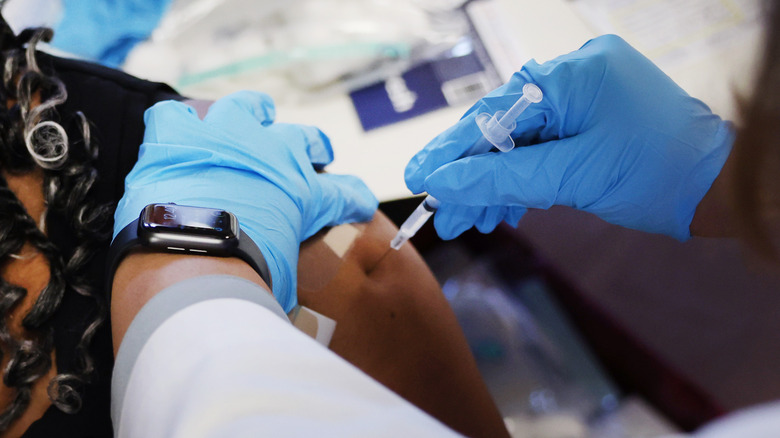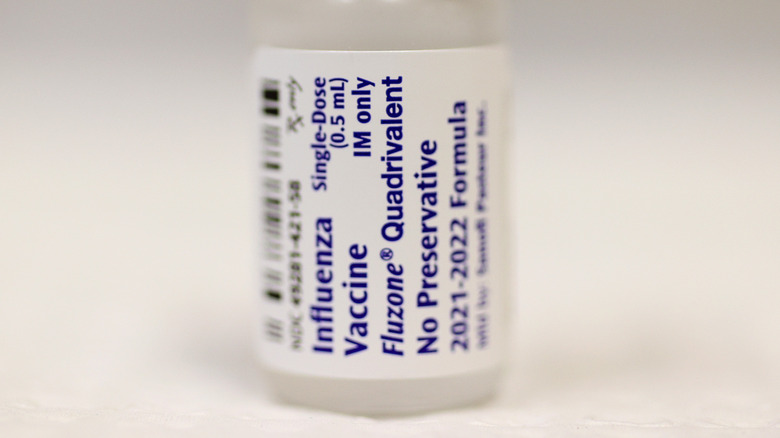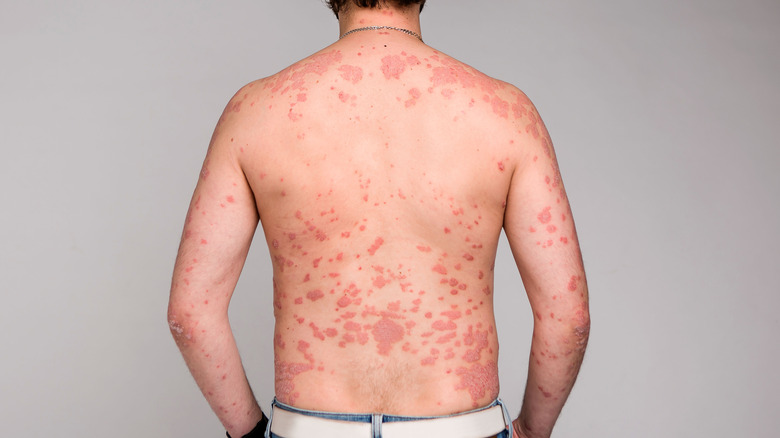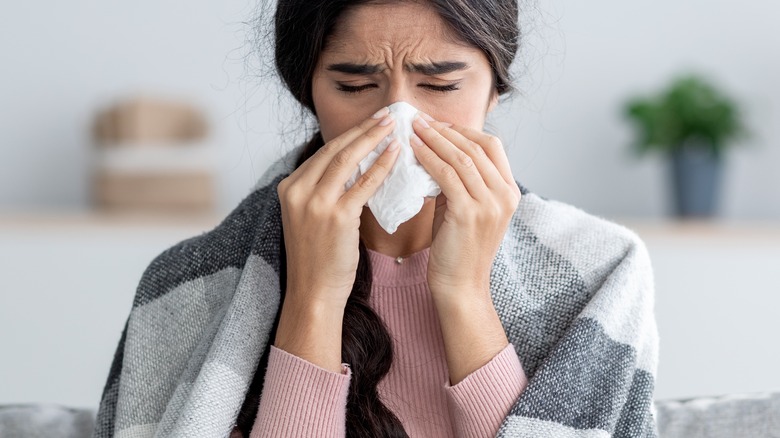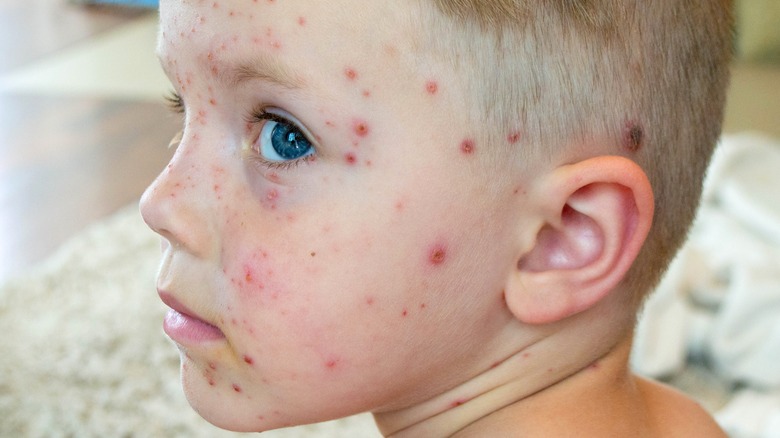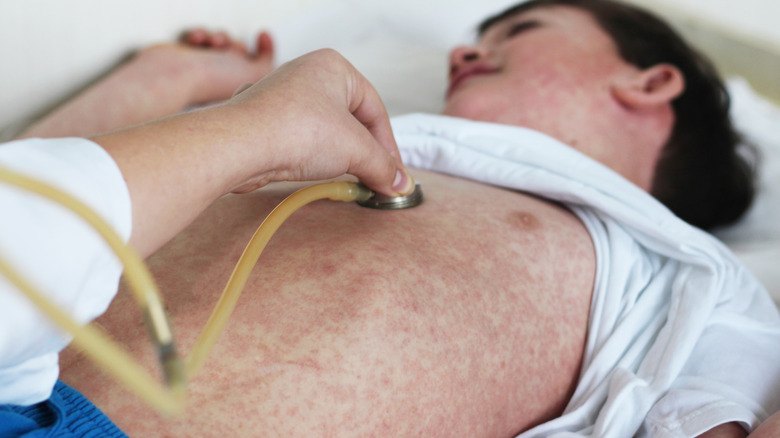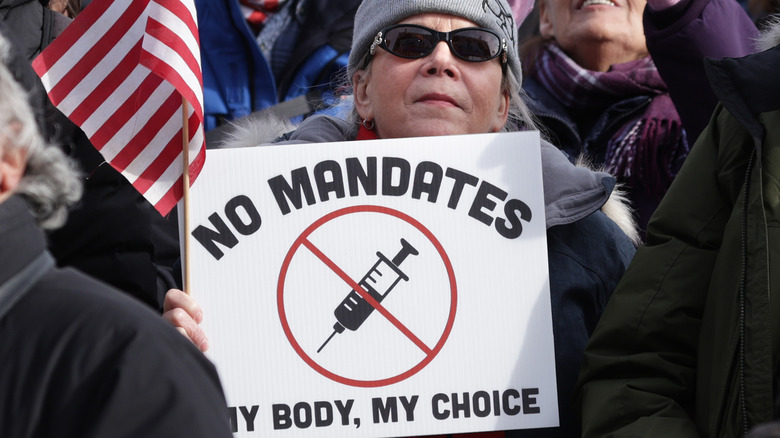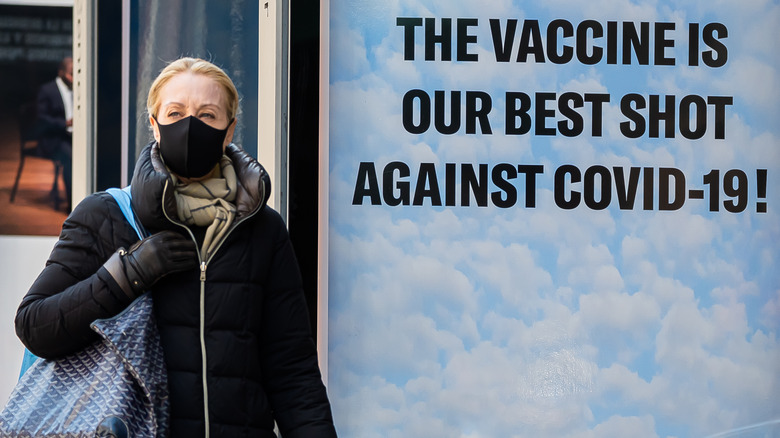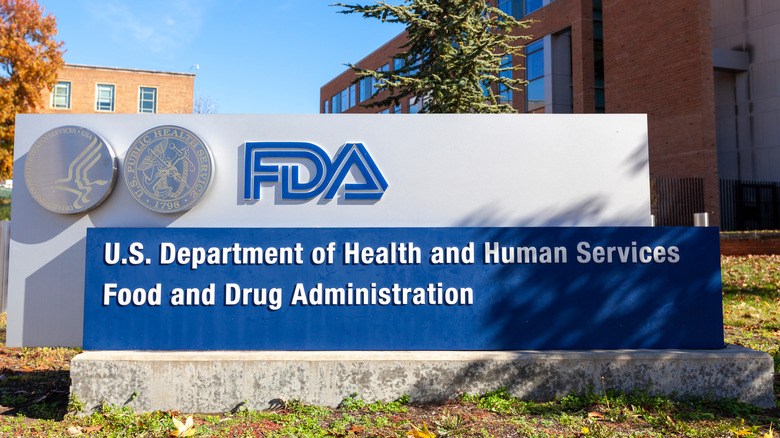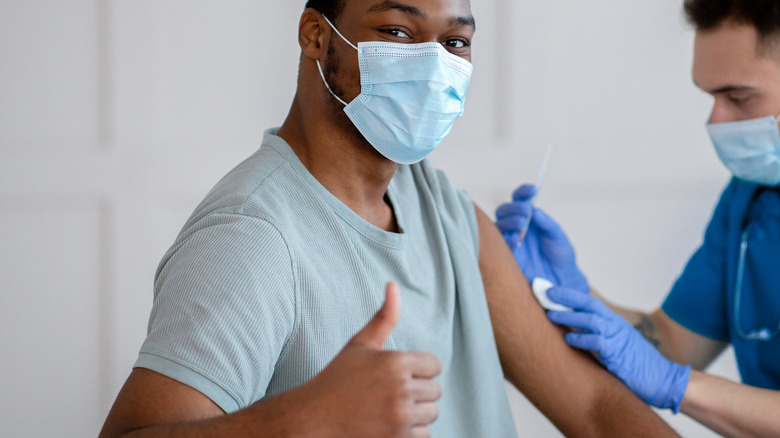Myths About Vaccines You Should Stop Believing
The Centers for Disease Control and Prevention called vaccines one of the greatest public health achievements of the 20th century. Vaccination enabled the eradication of smallpox, the near elimination of polio in North and South America, and has controlled the spread of infectious diseases such as tetanus, diphtheria, measles, mumps, rubella, and Hepatitis B for decades.
Without vaccines, our immune systems only learn how to fight disease-causing pathogens via infection, per Yale Medicine. If you get chickenpox, your immune system responds by sending immune cells called T cells and B cells to fight the infection. Some of these immune cells are destroyed, but others survive and retain a "memory" of how to fight that pathogen. So, the next time your body encounters chickenpox, the B and T cells know how to combat it, and they can do so before you even get sick.
Vaccines contain an artificial version of the pathogen that triggers an immune response. The immune cells that respond to the vaccine create a "memory" of how to fight the pathogen, so when they encounter the actual pathogen later on, they know how to respond. Ideally, this "memory" is enough to prevent the pathogen from ever making you sick.
Unfortunately, myths about vaccines are widespread. According to a paper published in the Journal of the American Medical Association, these myths can lead people to refuse vaccination, which can cause the recurrence of previously well-controlled infectious diseases. Here are some myths about vaccines you should stop believing.
Myth: Vaccines are made of harmful substances
One widespread myth about vaccines that causes a lot of fear is the myth that they contain harmful substances, per The Conversation. If you read the ingredients lists for some vaccines, you'll understand where this myth comes from. Vaccines actually do contain ingredients that can cause harm to the body. However, these ingredients are not harmful to the body when included in vaccines.
How can both things be true? The key lies in the dosage. Scary sounding ingredients like formaldehyde, thiomersal (which breaks down into mercury), and aluminum are all included in vaccines, but the dosages are way too low to harm the body. And believe it or not, we've consumed all of these ingredients at some point in our lives eating completely normal foods. Formaldehyde is a component of many fruits, the majority of canned tuna contains more mercury than any vaccine, and aluminum is in both breast milk and infant formula.
So, even though vaccines do contain ingredients we often think of as "toxic," vaccines don't contain any of these compounds in amounts that can damage the body.
Myth: Vaccines cause autism
In the 1990s, a doctor named Andrew Wakefield started researching a possible link between the MMR (mumps, measles, and rubella) vaccine and autism. According to a paper on the history of the myth that vaccines cause autism, Wakefield claimed that multiple children under his care developed symptoms of autism within months of receiving the MMR vaccine. He hypothesized that the vaccine caused inflammation that led to lesions in the colon which released a neurotoxin that damaged the brain, causing autism. When Wakefield performed colonoscopies on these children, he found lesions, so he assumed that his theory was correct. Wakefield published his findings, and the theory that vaccines caused autism got a lot of media attention. It gained widespread attention when actress Jenny McCarthy asserted that her son got autism after receiving the MMR vaccine.
In 2005, an investigation into Wakefield's research revealed that there were several problems with the study, that Wakefield may have fabricated information, and that he had serious conflicts of interest that compromised the results. As the British Medical Journal revealed years later, Wakefield was purposely trying to discredit the MMR vaccine so he could develop his own vaccine.
Since Wakefield's study linking autism to the MMR vaccine was discredited, several studies have shown that there is no link between the MMR vaccine and autism. The earliest signs of autism appear around the same time toddlers get the MMR vaccine. However, this is an example of correlation, not causation.
Myth: Vaccines cause Sudden Infant Death Syndrome (SIDS)
Sudden Infant Death Syndrome, commonly called SIDS, is a catch-all term used to classify the death of an infant that cannot be attributed to any identifiable cause, even after a thorough investigation into the death, per a paper published in the medical journal Toxicology Reports. That paper, and others, suggest that some portion of infant deaths classified as SIDS were actually due to complications from vaccines.
However, as a paper in the medical journal Clinical Infectious Diseases points out, extensive research has determined that there isn't enough evidence to prove that vaccine deaths are being classified as SIDS, or that vaccines cause a significant number of infant deaths. That being said, this myth is tricky because infants get vaccinated right around the same time that their risk for SIDS is highest. The timing is suspect, for sure, which is why this myth continues to circulate.
According to Reuters, in the fall of 2021 — just in time for flu vaccine season — a claim that "79.4% of babies who die of "SIDS" had a vaccine the same day" started making the rounds on social media. The claim was quickly addressed by the Centers for Disease Control and Prevention. The organization told Reuters that the misinformation was based on an incorrect interpretation of a study that actually found no evidence that vaccines cause SIDS deaths.
As with the "vaccines cause autism" myth, it's important to remember that correlation does not mean causation.
Myth: Vaccines cause autoimmune diseases
The myth that vaccines cause autoimmune diseases is another tough one to unravel, because the logic behind the myth makes sense. According to the American Academy of Pediatrics (AAP), research has suggested that because vaccines provoke an immune response, which could train the immune system to damage the body's healthy cells, vaccines can cause autoimmune disease.
However, as the AAP points out, the viruses that vaccines protect against also have the potential to train the immune system to attack the body. In fact, since viral infections provoke a much more intense immune response than a vaccine, getting infected with a virus is more likely to cause an autoimmune disease than getting a vaccine. So, people who are worried about autoimmune diseases have a better chance of avoiding one if they do get vaccinated.
The authors of a review of the current research on a potential link between vaccines and autoimmune diseases published in the medical journal Frontiers in Medicine concluded that though there's a plausible argument for a link, the evidence isn't there. They added that autoimmune diseases are complex and not well understood, so attributing them to one cause, like vaccination, is misleading.
Myth: Administering multiple vaccines at once overloads infants' immune systems
Babies get a lot of vaccines in the first two years of their lives. According to a study published in the Journal of the American Medical Association, the number of vaccines administered within the first 24 months of life went from three to 14 in the past three decades. That huge increase has led between 10 and 15% of parents to delay vaccinations or alter the vaccination schedule for their children. One of the concerns these parents cited was that giving their babies too many vaccines at once would overwhelm their babies' immune systems and make them more susceptible to disease in the future. However, the study found that children who were fully vaccinated weren't more susceptible to infections not targeted by the vaccines they received, indicating that their immune system function wasn't impaired by the vaccine.
In an interview about her research into infants' immune response to Covid-19, Dr. Donna Farber, a professor of microbiology & immunology and Surgical Sciences at Columbia University Vagelos College of Physicians and Surgeons, said that parents have no reason to worry about simultaneous vaccines having a negative impact on their children's immune systems. She pointed out that even before Covid, children were exposed to a massive amount of pathogens every day, and their immune systems are readily equipped to handle pathogen exposure. Farber stressed that getting vaccinated is the best way to help infants' immune systems, not overload them.
Myth: You can get the disease from the vaccine
Perhaps the most persistent myth about vaccines is that they can actually infect you with the disease they're supposed to protect you from. Unlike the majority of vaccine myths, this one does have a kernel of truth to it, according to Nemours Children's Health.
Attenuated vaccines — ones that are made from a live, weakened version of the virus – can cause a mild infection in some circumstances. Children with weakened immune systems are at risk of getting infected by the chickenpox and MMR vaccines, since they contain a live version of these viruses. However, this rarely happens, and the vast majority of children will never get sick from a vaccine containing a weakened live virus. On the rare occasions that infections happen, the infection is almost always milder than it would be if the child encountered the full-strength version of the virus.
The majority of vaccines are made from a dead or inactivated version of the virus they prevent, as Dr. Sarah Pozniak explains via GoodRx. These vaccines cannot cause infection. However, the inactivated or dead version of the virus does activate an immune system response, which is how these vaccines protect you from the disease. Sometimes, this immune response creates symptoms like body aches, a mild fever, a headache, and nausea that make people think that they got the disease that they were vaccinated against. However, these symptoms aren't symptoms of an infection. They're side effects of the vaccine.
Myth: Vaccine side effects are worse than the diseases they prevent
Some people will experience side effects from vaccinations, as a paper on the potential side effects of vaccines published in the medical journal NPJ Vaccines explains. Side effects happen because the vaccine triggers an immune system response, which triggers inflammation throughout the body. This inflammation is responsible for the common side effects experienced post-vaccine: soreness at the injection site, fever, muscle aches, and headache.
According to the Department of Health and Human Services (HHS), mild side effects are fairly common and usually go away within a day or two. HHS stresses that these side effects are much less severe than the symptoms of the actual disease, and that it's safer for the body to experience these side effects than the actual infection. Serious side effects do happen as a result of an allergic reaction to the vaccine. However, this is extremely rare. As the HHS explains, "If 1 million doses of a vaccine are given, 1 to 2 people may have a severe allergic reaction."
Though a tiny number of people will experience side effects that they deem worse than the actual disease, for the vast majority of people, vaccine side effects will be mild and short-lived. And that's much better than getting infected with a virus that could knock you down for a week or two.
Unfortunately, research has found that fear of side effects, short and long term, still motivates people to avoid vaccination.
Myth: It's better to just get infected
Natural immunity, the immunity you get from an infection, does usually provide better protection against the virus, per The Children's Hospital of Philadelphia. However, the risk of serious complications from the infection makes natural immunity dangerous.
For example, some parents who are nervous about the chickenpox vaccine think, "why not just get it over with so my kid gets immunity? Chickenpox isn't that dangerous, right?" This thinking is so prevalent that "Chickenpox Parties" are a relatively common occurrence, according to Parents Magazine. However, chickenpox can be dangerous for some kids. Some will develop pneumonia, issues with bleeding, brain swelling, skin infections, and bone infections. And a small percentage of kids will die from chickenpox. Pediatric infectious disease specialist Rodney E. Willoughby told Parents Magazine that the vaccine is absolutely safer than letting kids get chickenpox to gain natural immunity.
And chickenpox isn't the only vaccine-preventable virus that could do serious damage to your body if you catch it instead of getting the vaccine. Haemophilus influenzae type b (Hib) can cause developmental disabilities. Rubella can cause birth defects. Measles still kills people.
The medical professionals at The Children's Hospital of Philadelphia stressed that the cost benefit analysis of natural immunity through getting an infection and vaccines always shows that vaccines are the best bet for your health. The risk of serious side effects is low, they provide robust immunity, and they do so without damaging your body as much as an infection would.
Myth: We don't need to get vaccinated for rare or eliminated diseases
According to a paper published in The Journal of Pediatric Pharmacology and Therapeutics, one of the reasons why parents chose not to vaccinate their children against certain infectious diseases was the belief that it was no longer necessary to vaccinate against those diseases because they were so rare. These parents believed that their children were so unlikely to encounter the disease that it was not necessary to vaccinate their kids against it.
Unfortunately, this false belief led to lower rates of vaccinations against certain diseases, which has created a resurgence of infectious diseases that were once well controlled or even non-existent in the United States. Outbreaks of measles, whooping cough, and even polio are now popping up all over the United States, according to the Yale School of Medicine. In an interview with Yale, Dr. Howard Forman pointed out that "one pocket of unvaccinated individuals and one traveler from another part of the world with an infection" can start an outbreak of an infectious disease, even if it was extremely rare in or eliminated from a population.
So, it's important to get vaccinated against all vaccine-preventable diseases, even if you believe there's very little chance you'll encounter the disease and get infected.
Myth: Not getting vaccinated only impacts yourself
According to a paper published in Human Vaccines & Immunotherapeutics, a common belief among people who choose not to get vaccinated and parents who choose not to vaccinate their children is that their personal choice doesn't really impact other members of their community. As a paper published in the medical journal Pharmacy and Therapeutics points out, if just a few members of a community chose not to vaccinate themselves and their families, there wouldn't be a big impact. However, because of rising rates of vaccine refusal, large numbers of people in particular communities remain unvaccinated, which poses a significant threat to those communities and the surrounding areas.
An infectious disease needs a certain number of hosts in order to spread, per the Department of Health and Human Services. When large numbers of people in a community aren't vaccinated, the disease has more available hosts, which allows it to spread more effectively. Additionally, there are always people in each community who cannot get vaccinated. This includes infants who are too young to receive vaccinations, people with severe allergies to vaccine ingredients, and people whose immune systems are too weak to respond properly to vaccinations. High rates of vaccination in a community protect these people, even though they can't get vaccinated.
Each person who chooses not to get vaccinated or not to vaccinate their family contributes to the community's spread of infectious diseases — and puts those who can't get vaccinated at risk.
Myth: Herd immunity will protect you
Herd immunity happens when the vast majority of people in an area are immune to a disease, per the Association for Professionals in Infection Control and Epidemiology. Because so many people are immune, the infectious disease can no longer spread effectively, so it dies out in that area. Herd immunity provides protection for those who aren't vaccinated as well.
However, herd immunity only works if a high percentage of the population is vaccinated. For most infectious diseases, at least 80% of the population needs to be immune, through vaccination or infection, before herd immunity is effective, according to a paper published in Frontiers in Microbiology. For highly contagious diseases like measles, 93-95% of the population needs to be immune for herd immunity to be effective.
Unfortunately, the high number of people who choose not to get vaccinated tends to compromise herd immunity. According to CNBC, in 2019, the number of unvaccinated people was as high as 14% in some areas of the country. According to the United States Census Bureau, about 15% of the country is still not vaccinated against Covid-19.
Per the Association for Professionals in Infection Control and Epidemiology, the high rates of unvaccinated people in the U.S. have caused many communities to drop below the required threshold for herd immunity. So, the belief that herd immunity will protect those who choose not to get vaccinated is no longer true.
Myth: Boosting your immune system is enough to protect you
A paper published in the scientific journal PLOS One found a strong relationship between belief in complementary and alternative medicine (CAM) and refusal to get vaccinated. The paper's authors posited that people with a strong belief in alternatives to conventional medicine may refuse vaccines due to distrust for traditional medical providers, the healthcare system, the government, and pharmaceutical companies.
The authors also noted that a common belief held by believers in CAM is that disease can be prevented by using natural methods to increase the body's resistance to diseases. Dr. Suzanne Cassel, an immunologist at Cedars-Sinai, said in an interview that the common term for this concept is "boosting immunity."
Though the internet is full of articles with tips for "boosting immunity," Dr. Cassel explained that "[t]he immune system is really complicated." She went on to say that there's so much we don't understand about how the immune system functions, so any tips to improve immune system function likely aren't supported by science. Dr. Cassel stressed that eating a balanced diet, exercising, sleeping well, and not smoking can keep your immune system functioning at its best. However, these things do not prevent you from getting infected with a virus. Neither do the various supplements, herbs, and potions that people are selling online. She emphasized that the only ways to prevent disease are washing your hands, staying away from sick people, and getting all of your recommended vaccinations.
Myth: Vaccines aren't well-tested
A review of the existing studies on reasons for vaccine refusal published in Open Forum Infectious Diseases found that one of the prominent reasons behind vaccine refusal was the belief that vaccines don't go through a rigorous enough testing process. This belief tracks with the fact that many of the people who choose not to get vaccinated or vaccinate their families tend to distrust medical professionals and medical research.
As the FDA points out on its site, all vaccines carry the risk of side effects, and a rare number of people will experience severe side effects. However, the benefit of getting vaccinated still outweighs the potential harms of being unvaccinated. Additionally, the FDA has a complex, six-phase testing process to ensure that vaccines are as safe as possible, as described in a paper published in the North Carolina Medical Journal. First, the concept for the vaccine must be approved. Then, it undergoes investigation and preclinical trials before moving on to three phases of clinical trials. After those trials are complete, the vaccine manufacturer applies for a license and submits the vaccine to the FDA for approval. All of the clinical trial results are reviewed before an approval is granted, and research on the efficacy of the vaccine continues after it's rolled out for public use.
This highly regulated process ensures every vaccine that makes its way to your doctor's office has been proven to be as safe as possible.
Myth: Vaccines aren't effective
Sometimes, even if you're vaccinated, you can still get an infectious disease. The Brookings Institution states that this is because no vaccine is 100% effective at preventing the disease it targets. Because of that, some people mistakenly assume that vaccines aren't effective enough to make them worth getting.
There are a few reasons why this logic doesn't hold up. The first is that research has shown that most vaccines are 90-99% effective. Second, one of the reasons that diseases that were once well-controlled are making a comeback is because people are choosing not to get vaccinated, which eliminates herd immunity. Without herd immunity to protect unvaccinated people, infectious diseases can spread and mutate more easily. And even if vaccines don't prevent infection, they are very effective at preventing severe disease, according to a paper published in the Pharmaceutical Statistics Journal. So, vaccines are worth getting even if you still get sick, because they'll prevent the most severe health outcomes.

